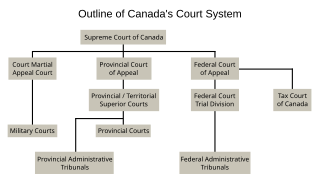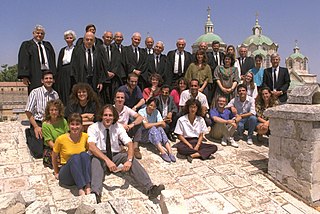The politics of Canada function within a framework of parliamentary democracy and a federal system of parliamentary government with strong democratic traditions. Canada is a constitutional monarchy, in which the monarch is head of state. In practice, the executive powers is directed by the Cabinet, a committee of ministers of the Crown responsible to the elected House of Commons of Canada and chosen and headed by the Prime Minister of Canada.

The Supreme Court of Canada is the highest court of Canada, the final court of appeals in the Canadian justice system. The court grants permission to between 40 and 75 litigants each year to appeal decisions rendered by provincial, territorial and federal appellate courts. Its decisions are the ultimate expression and application of Canadian law and binding upon all lower courts of Canada, except to the extent that they are overridden or otherwise made ineffective by an Act of Parliament or the Act of a provincial legislative assembly pursuant to section 33 of the Canadian Charter of Rights and Freedoms.
The Canadian Charter of Rights and Freedoms, in Canada often simply the Charter, is a bill of rights entrenched in the Constitution of Canada. It forms the first part of the Constitution Act, 1982. The Charter guarantees certain political rights to Canadian citizens and civil rights of everyone in Canada from the policies and actions of all areas and levels of the government. It is designed to unify Canadians around a set of principles that embody those rights. The Charter was signed into law by Queen Elizabeth II of Canada on April 17, 1982, along with the rest of the Act.
The Right Honourable is an honorific style traditionally applied to certain persons and collective bodies in the United Kingdom, Canada, Australia, New Zealand, Fiji, some other Commonwealth realms, the Anglophone Caribbean, Mauritius, Zimbabwe and occasionally elsewhere. The term is predominantly used today as a style associated with holding certain senior government offices in the United Kingdom, Canada, and New Zealand.
Canadian federalism involves the current nature and historical development of federal systems in Canada.
Same-sex marriage in Canada was progressively introduced in several provinces by court decisions beginning in 2003 before being legally recognized nationwide with the enactment of the Civil Marriage Act on July 20, 2005. On June 10, 2003, the Court of Appeal for Ontario issued a decision immediately legalizing same-sex marriage in Ontario, thereby becoming the first province where it was legal. The introduction of a federal gender-neutral marriage definition made Canada the fourth country in the world, and the first country outside Europe, to legally recognize same-sex marriage throughout its borders. Before the federal recognition of same-sex marriage, court decisions had already introduced it in eight out of ten provinces and one of three territories, whose residents collectively made up about 90% of Canada's population. More than 3,000 same-sex couples had already married in those areas before the Civil Marriage Act was passed. Most legal benefits commonly associated with marriage had been extended to cohabiting same-sex couples since 1999.
The Canadian legal system has its foundation in the English common law system, inherited from being a former colony of the United Kingdom and later a Commonwealth Realm member of the Commonwealth of Nations. The legal system is bi-jurisdictional, as the responsibilities of public and private law are separated and exercised exclusively by Parliament and the provinces respectively. Quebec, however, still retains a civil system for issues of private law.

The Chief Justice of Canada is the presiding judge of the nine-member Supreme Court of Canada, the highest judicial body in Canada. As such, the chief justice is the highest-ranking judge of the Canadian court system. The Supreme Court Act grants plenary power to the Governor General to appoint—with the advice of the Prime Minister—a chief justice, who serves until they resign, die, are removed from office for cause, or attain the age of 75 years. By tradition, a new chief justice is chosen from among the Court's incumbent puisne justices.

Canadian nationality law is promulgated by the Citizenship Act since 1977. The Act determines who is, or is eligible to be, a citizen of Canada. The Act replaced the previous Canadian Citizenship Act in 1977 and has gone through four significant amendments, in 2007, 2009, 2015 and 2017.

The Constitution Act, 1867 is a major part of Canada's Constitution. The Act created a federal dominion and defines much of the operation of the Government of Canada, including its federal structure, the House of Commons, the Senate, the justice system, and the taxation system. The British North America Acts, including this Act, were renamed in 1982 with the patriation of the Constitution ; however, it is still known by its original name in United Kingdom records. Amendments were also made at this time: section 92A was added, giving provinces greater control over non-renewable natural resources.
Canada holds elections for legislatures or governments in several jurisdictions: nationally (federally), provincially and territorially, and municipally. Elections are also held for self-governing First Nations and for many other public and private organizations including corporations and trade unions. Municipal elections can also be held for both upper-tier and lower-tier governments. Formal elections have occurred in Canada since at least 1792, when both Upper Canada and Lower Canada had their first elections.
The Court of Appeal for Ontario is an appellate court in Ontario that is based at historic Osgoode Hall in downtown Toronto.
Pierre Blais, is a Canadian jurist and former politician and Cabinet minister. He also served as the Chief Justice of the Federal Court of Appeal until his retirement in June, 2014.

The court system of Canada forms the judicial branch of government, formally known as "The Queen on the Bench", which interprets the law and is made up of many courts differing in levels of legal superiority and separated by jurisdiction. Some of the courts are federal in nature, while others are provincial or territorial.
The Federal Court of Appeal is a Canadian appellate court that hears cases concerning federal matters.

A law clerk or a judicial clerk is an individual—generally an attorney—who provides direct assistance and counsel to a judge in making legal determinations and in writing opinions by researching issues before the court. Judicial clerks often play significant roles in the formation of case law through their influence upon judges' decisions. Judicial clerks should not be confused with legal clerks, court clerks, or courtroom deputies who only provide secretarial and administrative support to attorneys and/or judges.

The Federal Court is a Canadian trial court that hears cases arising under certain areas of federal law. The Federal Court is a lower court with nationwide jurisdiction.
Canadian constitutional law is the area of Canadian law relating to the interpretation and application of the Constitution of Canada by the courts. All laws of Canada, both provincial and federal, must conform to the Constitution and any laws inconsistent with the Constitution have no force or effect.
Federal judges are judges appointed by a federal level of government as opposed to the state/provincial/local level.






